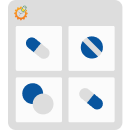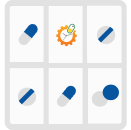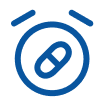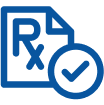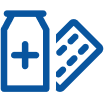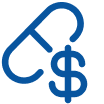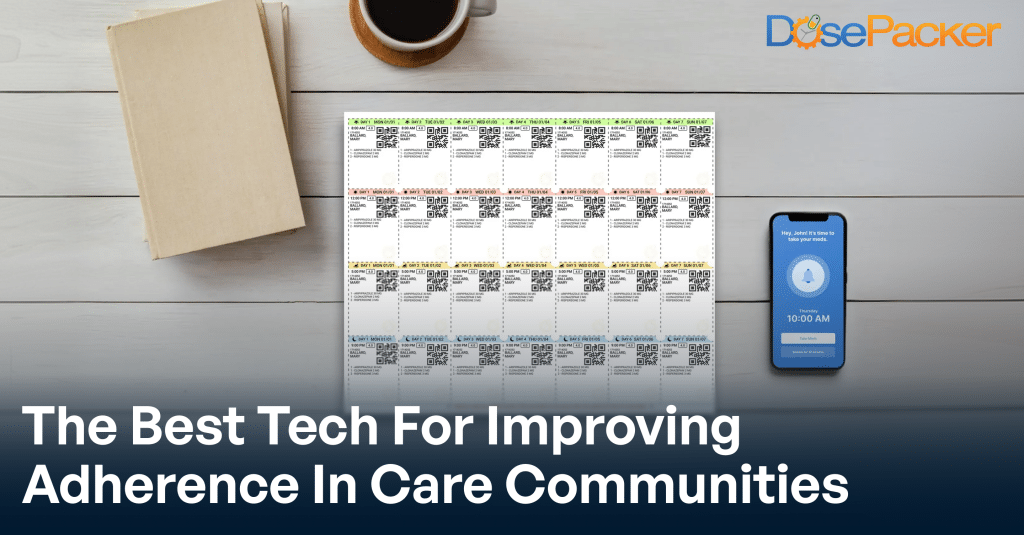Unlock the latest in medication management technology and grow your care community with us.
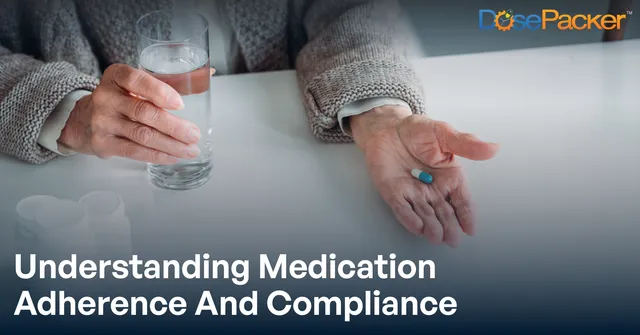
Medical terminologies are the foundational pillars of communication in the healthcare industry. Understanding and using them accurately promotes accuracy, safety, and efficiency in patient care.
This blog aims to help you differentiate between two medical terms that are often used interchangeably but actually have different meanings – medication adherence and compliance. The distinction between medication adherence and compliance is often blurred, yet it holds significant implications for patient outcomes.
Poor medication adherence costs the healthcare system approximately $300 billion a year. Similarly, deteriorating patient compliance has become a constant concern for healthcare providers. Considering these statistics, we need to understand the nuances between adherence and compliance, as they can dramatically impact treatment efficacy.
In pursuing better patient results, healthcare providers can leverage innovative solutions like those offered by DosePacker, which can play a pivotal role in bridging the adherence gap. We aim to improve patient health outcomes by tackling adherence and compliance head-on.
Prescribe To Peace Of Mind
Medication Adherence vs. Compliance: What Are They Actually?
Okay, let’s get this straight once and for all. Adherence is an active choice wherein patients take responsibility for their well-being by following the prescribed treatment course. This may also include making the necessary lifestyle changes.
While patient compliance also stands for following the healthcare provider’s instructions, it is a passive behavior from the patient’s end. They are simply “doing as told” with no proactive steps from their end.
Here’s a closer look:
What Is Medication Adherence?
Medication adherence refers to how well patients follow their medication regimen as prescribed by their healthcare provider. It is an essential component of optimal healthcare management and patient care. It usually involves:
- Taking medications as prescribed without missing doses.
- Following the timing and frequency instructions carefully.
- Not altering the prescribed dose without consulting a healthcare provider.
Why is adherence so important? When patients stick to their medication plan:
- Their treatment works better.
- They have fewer complications.
- They spend less time in the hospital.
Research shows that even a 10% increase in adherence for a common chronic condition like diabetes can be linked with an 8.6% to 28.9% decrease in total annual healthcare costs. Good adherence helps patients stay healthier and saves money on healthcare costs. It’s a win-win for everyone involved.
What is Patient Compliance?
Patient compliance, on the other hand, focuses on the patient’s behavior in following healthcare provider instructions. It is characterized by:
- Administering medications as advised by the healthcare provider.
- Attending follow-up appointments and following instructions.
- Sticking to the treatment plan given
The main idea behind compliance is that the patient does what they’re told. This is different from adherence in a few ways:
- Compliance focuses on following instructions
- It doesn’t necessarily involve patient agreement
- The patient might not fully understand why they’re taking the medication
By distinguishing between medication adherence and patient compliance, medical professionals can customize their patient care strategies and offer targeted support to help individuals effectively manage their medication regimens and overall health.
Differences Between Patient Compliance and Adherence
We’ve discussed compliance and adherence separately. Now, let’s compare the difference between medication adherence and compliance:

Compliance can be seen as a more straightforward, short-term measure of a patient’s actions, while adherence is a comprehensive approach that includes understanding and willingness.
Ways to Improve Medication Adherence
Now that we know how important medication adherence and patient compliance are, the next step is to focus on ways to improve them. After all, they are crucial for achieving the best possible health outcomes.
Here are some effective strategies:
- Simplify the regimen: Healthcare providers can streamline the medication schedules. They can also implement medication synchronization, which is a key to eliminating medication non-adherence.
- Empower the patients with knowledge: Communicating with the patients helps them better understand their condition. The more they know, the more motivated they will be to take medications as prescribed.
- Enlist Support: Involve family, friends, or caregivers in medication management. They can provide encouragement.
- Use Medication Reminder Tools: Leverage products like pill organizers, reminders, and delivery services to minimize forgetfulness. Studies have shown that medication reminders can increase adherence by 0.95% to 0.98%
By implementing these strategies, you can take an active role in improving patient compliance and medication adherence.
Patient’s Health, Our Mission: DosePacker’s Promise

Navigating the challenges of medication adherence can be daunting. At DosePacker, we understand patients’ challenges in managing their medications and are committed to providing solutions that empower patients to take control of their health.
Our solutions are made to fit caregiver’s and healthcare provider’s lives, not the other way around. Here’s how:
- Compliance Packaging: With a compliance pack, the patient’s meds come sorted and labeled for each dose. They are also color-coded according to HOA, further minimizing confusion and reducing the chance of missed doses.
- DoseMinder: As we have seen, medication reminder devices can improve adherence. DoseMinder is one such smart medication reminder device. It pairs with our MyDoses app, which sends necessary reminders through push notifications on the phone and records whether the patient has taken the meds.
The compliance med pack placed in the DoseMinder has QR codes on each dose cup that are scanned by the device to identify and highlight the correct dose to be administered. So, DoseMinder not only increases medical adherence but also reduces medication errors during drug administration.
We commit to making medication management simpler, safer, and more effective for everyone. Choose DosePacker today to take the first step towards better adherence and improved health outcomes.
Transform Your Med-Pass Routine
Taking medications correctly is crucial for the patients’ and residents’ health. Whether we call it adherence or compliance, the goal is the same: to help them get better and stay healthy.
Whether you use tools like DosePacker or find other methods that work for you, staying engaged with your treatment plan is vital. Work with healthcare providers, ask questions, and find a system that helps them take their medications correctly each and every time.
